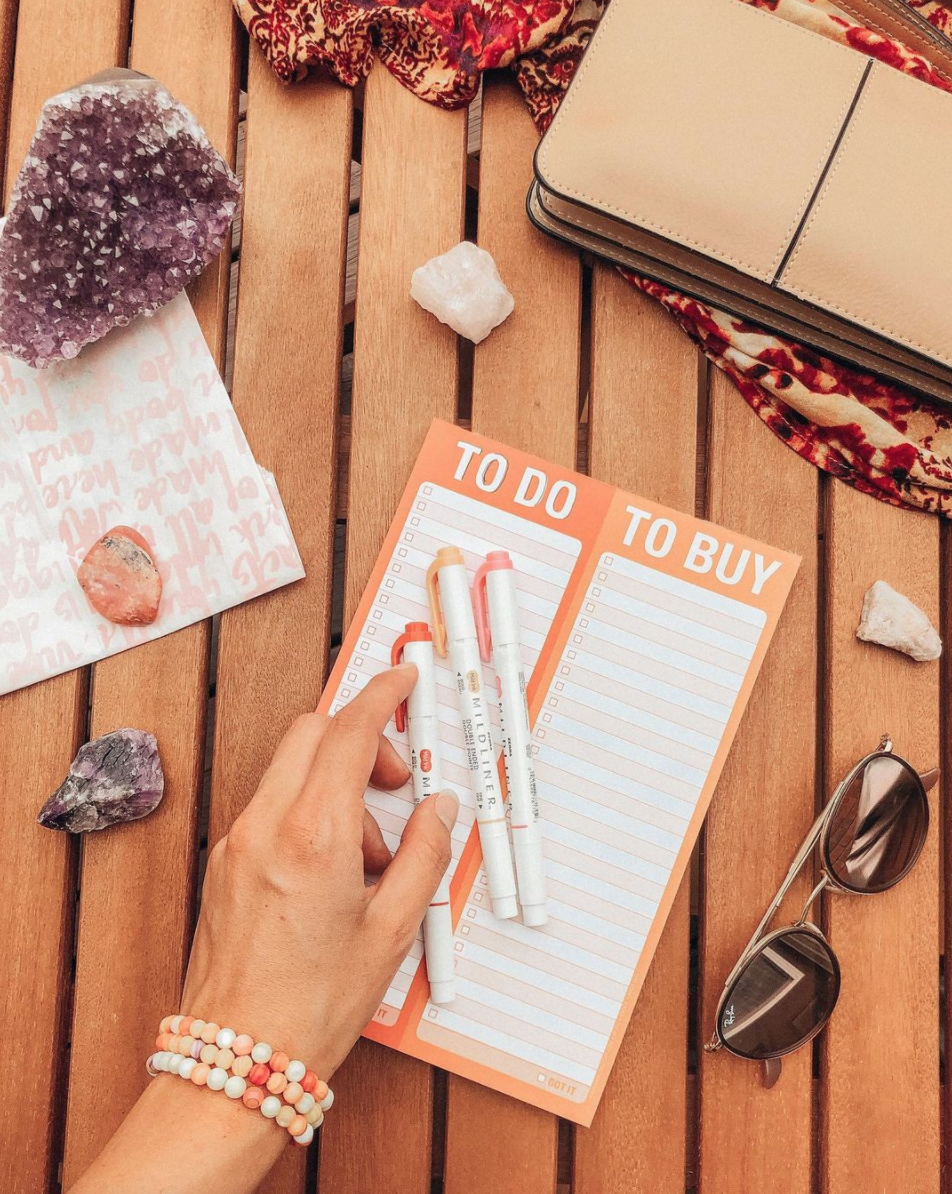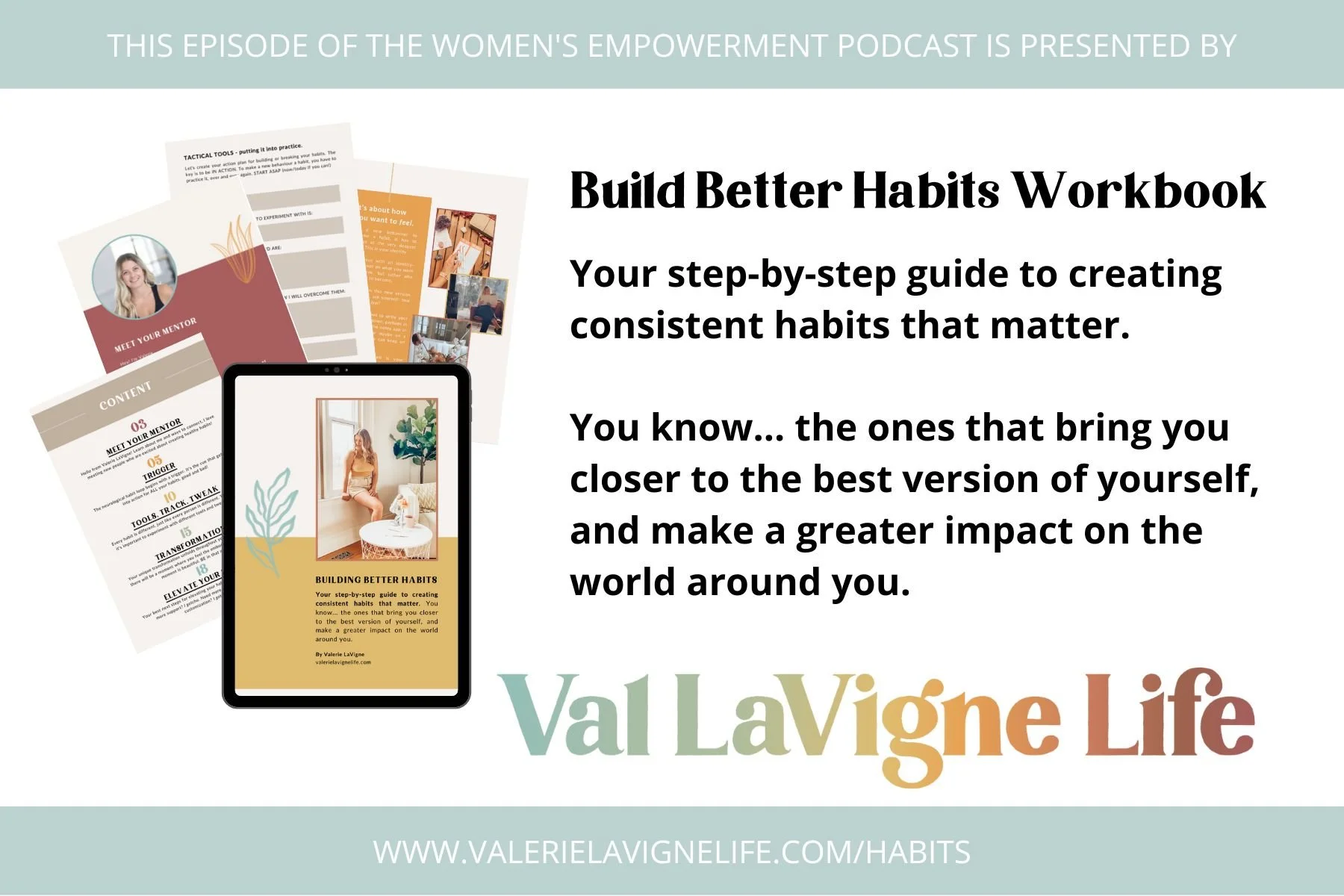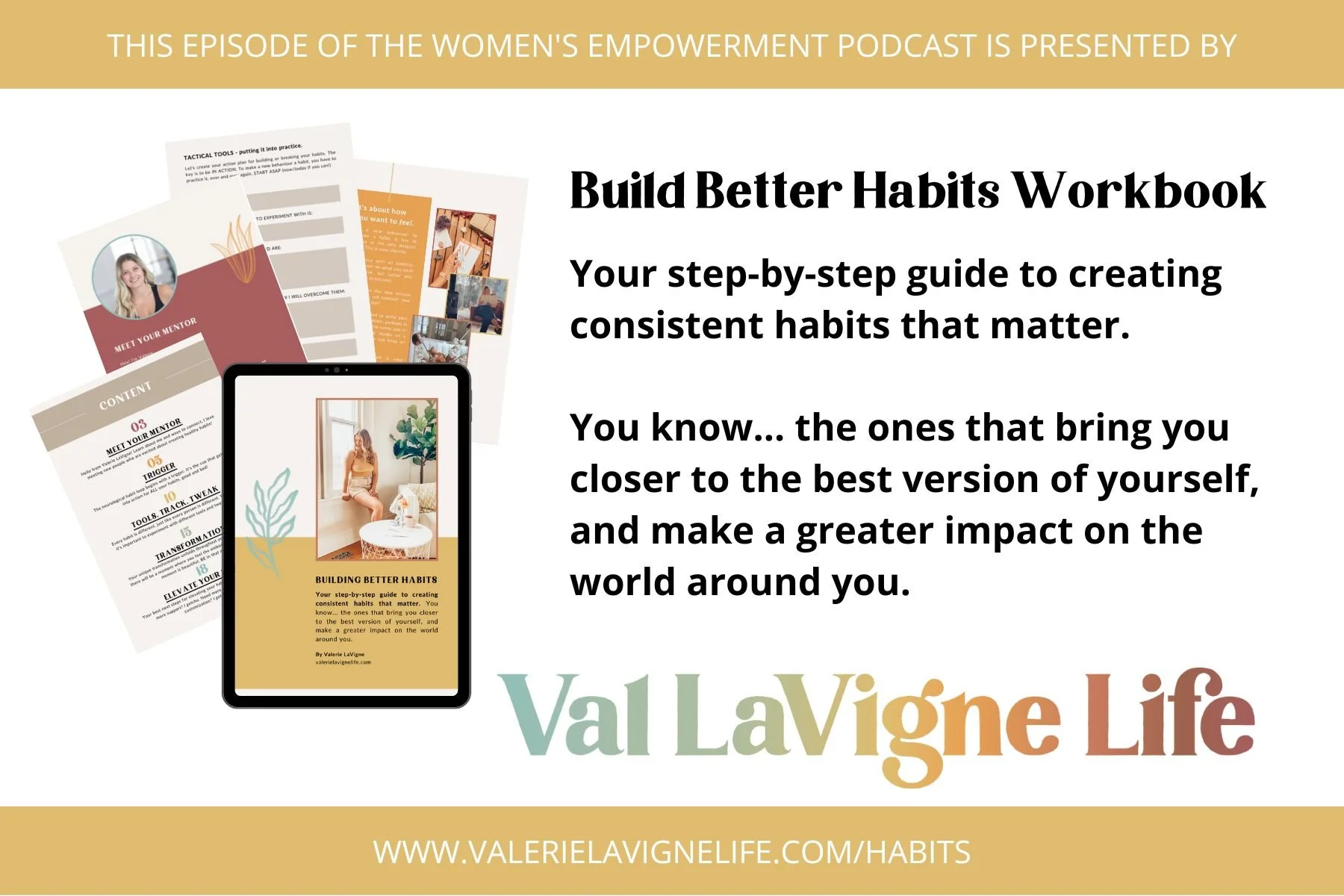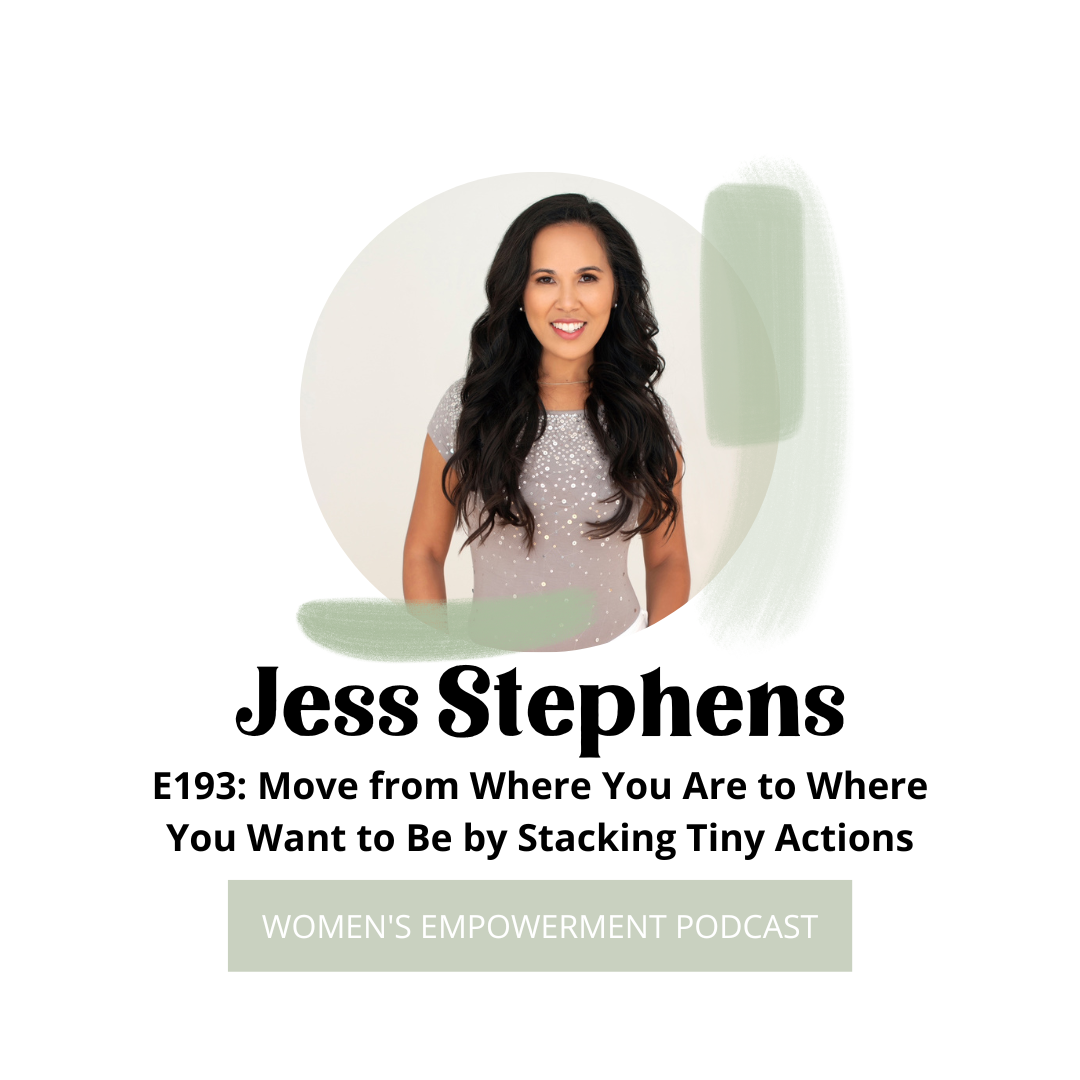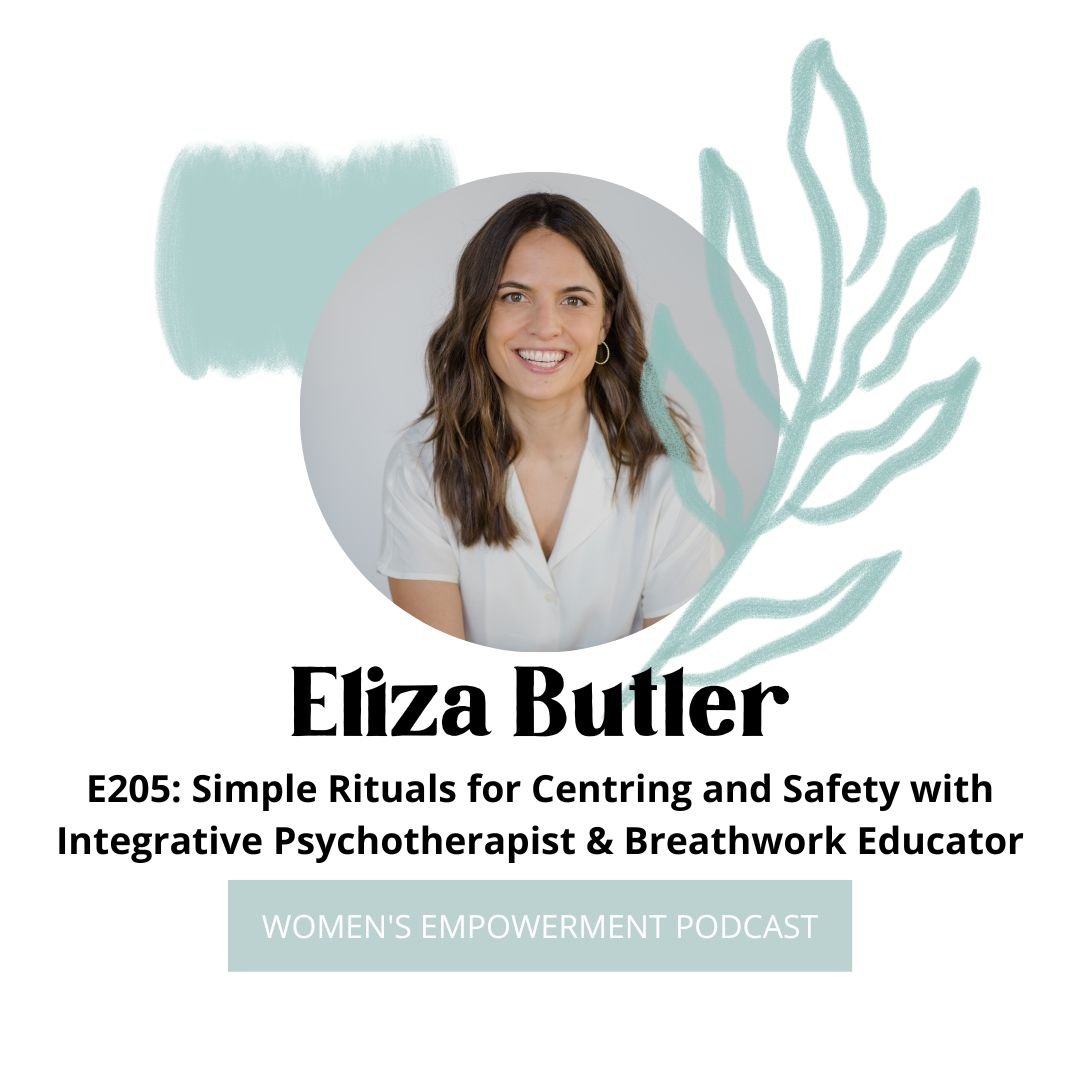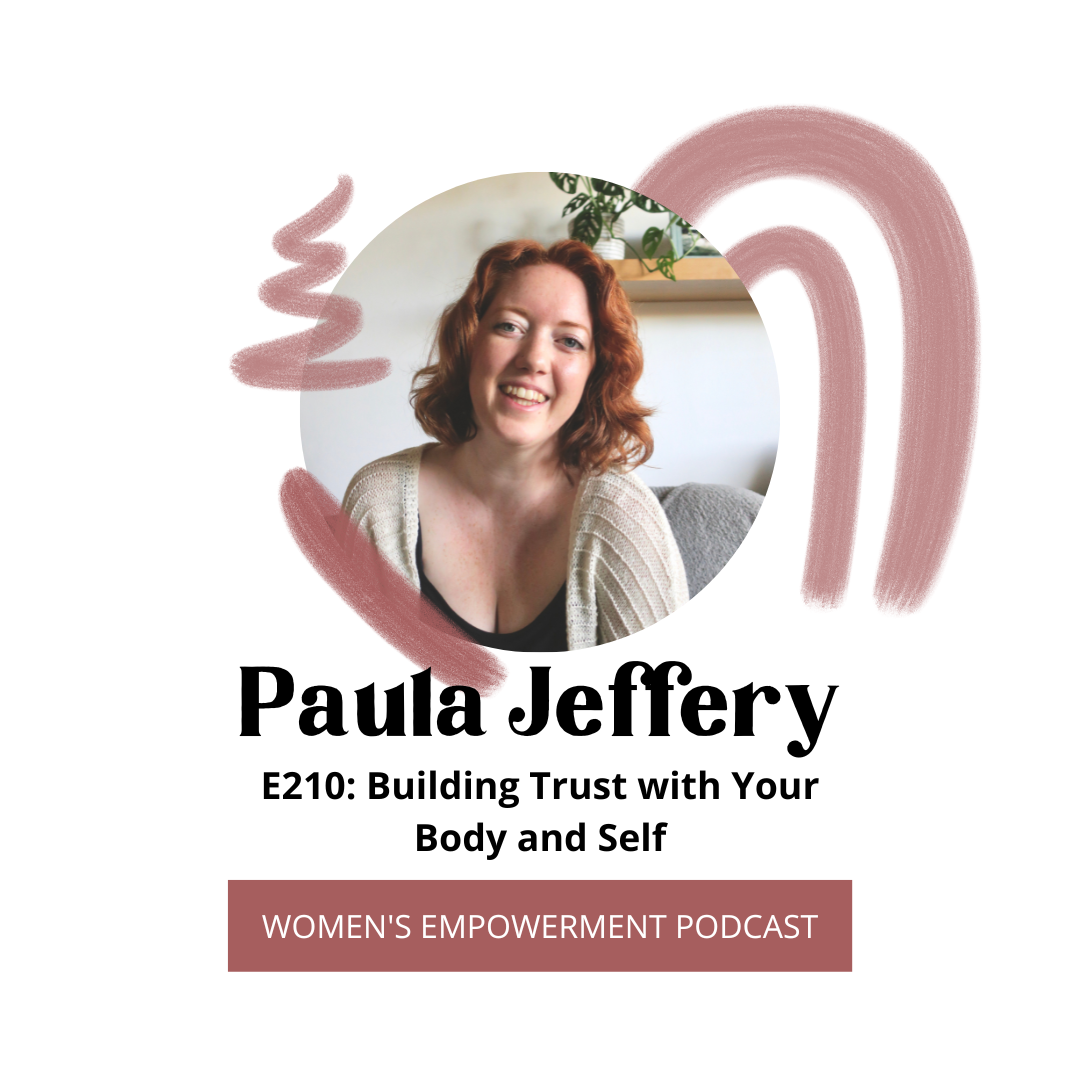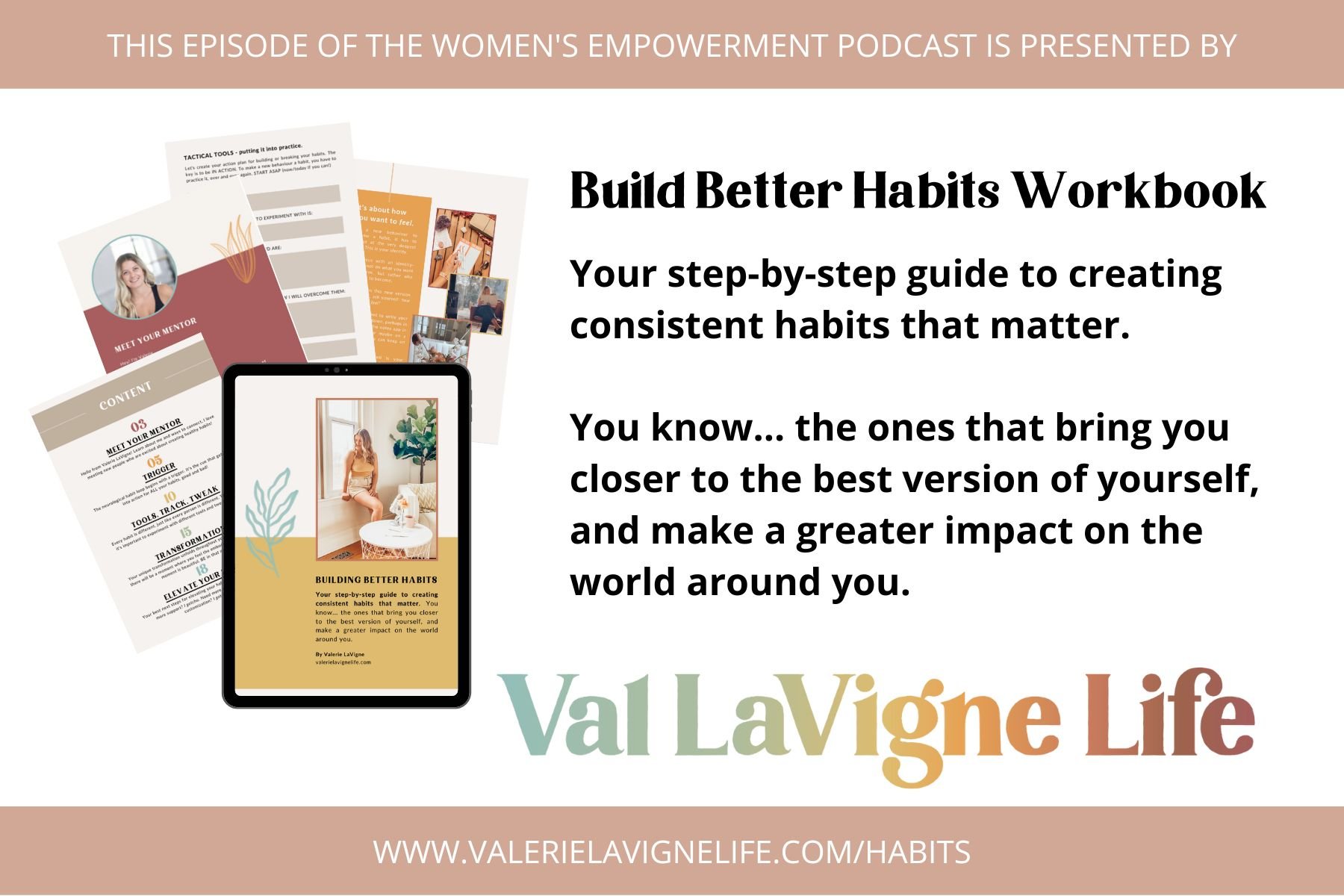E223: Gain Clarity & Empower Your Career with Emilia Stypulkowska
Emilia Stypulkowska is a career coach and founder of Sunny Side Up Coaching. She helps people define their vision for their career, articulate their impact, and land their dream job…
Leave a review on Apple Podcasts
[00:42] Valerie LaVigne: Welcome back to The Women's Empowerment Podcast, Emilia, thank you so much for being on the podcast today. I know we've talked about having this conversation, and now we are finally doing it so I'm so excited that you're here today.
Emilia Stypulkowska: Yeah, thanks so much for having me. I'm really looking forward to our chat.
VL: And it's kind of cool because we have gotten to know each other through different networks and kind of mutual friends and things like that. However, I've been really lucky to attend some of your workshops and to see kind of what you do and how you do it. And at first when I was getting to know you, I don't really need a career coach because I am an entrepreneur and I run my own businesses and but I wanted to support you still right as a friend and I thought, Okay, well I'm gonna try this out and I have friends and my partner he is in a corporate setting for his work. So you know, I know people who would benefit from this and so I wanted to, to see what it was all about. And I was blown away by not only you and what you do and how you articulate it because it's pretty incredible how you can within like a what was like a one hour workshop, we did have the transformation that came out of this workshop, but also how it was applicable to my own self in my entrepreneurship journey as a business owner. So I think that is really incredible and I'm I'm I want to formally apologize to you for thinking that I didn't need your services.
ES: Hahaha There was absolutely no need to apologize!
But I'm glad that you know that you found it really useful and helpful the work that we did you know, despite the fact that you're on this, like less conventional path and a lot of my clients.
VL: Yeah, it was pretty incredible. So I'm excited to chat with you about that today because I feel like no matter where you are in your career or business journey, there is something to be said about what you teach and how you teach it. So I feel like we should just dive right in.
ES: Yeah.
VL: One of the things I really love about your workshop was when you had us take inventory of our current job, so maybe can you start us with the first step or walk us through how that works? Because you're the expert, so I don't want to try to explain it and butcher it.
ES: Yeah, absolutely.
So what I have people do is write out a list of daily or weekly tasks as well as bigger projects that they work on for their role. And they can do that take them inventory of their most recent job or their current job or a past job event. And really, the longer the inventory, the more information that you're going to get out of it. And the more insights they think. So number one, you take that inventory and just write everything out. Just do a brain dump. I remember someone came to my workshop, and she didn't write down any of the tasks that she didn't enjoy. Like, no, we're gonna, we're gonna get information from that too. So really just a full on brain dump.
You know, of everything that you do in the project.
And so that's the first step. And then the second step is just to categorize everything. And in my workshop, I have a bit of a legend in terms of how people can categorize different tasks, whether it's strategic, collaborative, for people, or data oriented.
And really categorize each task. Some of the tasks might be the same, like some of them might be the same. Some of them might have more than one category of half so it might be collaborative and collaborative and strategic or whatever it is. And then, so then I take people to a few more steps to kind of really, really take a look at everything and and start to see the patterns between the tasks and projects that they're not enjoying, and what do these things have in common? And so what is it about those things that they don't enjoy? And I think similar to kind of work you experience in the workshop, people start to see that their job isn't just their job. It's not a big blob. It's actually lots of little puzzle pieces. And there might be aspects of it that they enjoy and aspects of it that they don't enjoy. But then from that information, you can sort of start to form a picture of what you don't want and then a vision of what you do want, which you will move toward.
[05:33] VL: And I thought that was so powerful to break it into all those different components because, you know, you're having conversations with people, your friends, your family, whoever but you don't really understand their job fully. You're not in their shoes. So when they say oh, my job is so stressful. Oh, I really am not enjoying my job. You're just thinking like, Okay, we'll just leave your job to do something else. But it's not that simple most of the time. And it's also are we taking that time to look at what we actually do not like about the job? And is there an opportunity for us to change things within that and to see what's working and what's not? Can we make something adjustable so that we can stay where we are and still do the things that we enjoy? So for me that was a huge realization. Because I recognize them like, like, I should do a lot of things that I don't enjoy, but I don't have to do those things. I can delegate those tasks and focus on the things that I do enjoy, and then be better at my job because of it. So maybe I just gave it away but why is this so important for us to do this practice? You have a name for it? Should I call it something or?
ES: I call it a Career Clarity exercise.
Yeah, and definitely, I think it's important because you start to see things more clearly and you can start to see how okay, then when I'm looking at this job description of this job that I'm applying for, does it have similar components or categories that I also don't love? So you start being able to see things for the pieces versus just looking at it as a whole? Because that's actually one of the surprising things that I've found. In working with my clients is but people aren't always really good at looking at a job description and deciphering what exactly this job looks like on a day to day basis. And I think that this exercise helps you get a little bit better at looking at those things and and getting more savvy about looking at job descriptions. And so for you, you know, as an entrepreneur, you might be able to delegate some of those things that you don't enjoy. But I think for you know, our nine to fivers. They can also talk to their boss and say, Listen, you know this category. You know, I'm finding it really tedious and routine and as pulling away from this, which maybe has a bigger impact or an ROI.
You know, could we sort of shift these tasks either to someone else or, you know, if you're growing in your role or looking at a promotion, like what do you want to lean into more and what do you want to lean out? of? So I think that this information is helpful for everyone.
VL: Yeah, absolutely. I love that and it prepares you for those conversations. And I like what you said about when you're looking at the job description, you're looking at more because a job description, in my opinion, is really a sales. We want to hire someone and these are all the best parts about your job. But what does that really mean? Right, because it's a job description usually Well, from my experience, it's not that detailed. So being able to ask questions and know where you are, where you strive as an employee, or in your skill set. and then knowing that yeah, there's flexibility or there's room for me to adjust this or this exists. It's exactly what I'm looking for, like almost nothing what I'm looking for, even though it looks really pretty in his package in a bow, It might it might not be the right date right so yeah, I think it's a, it's a very simple yet powerful practice is there anything that we need to keep in mind when we're doing this exercise for ourselves?
ES: Um, yeah, I think I think something as simple as you know, sometimes it's more clear to us what we don't want than it is what we do want and just kind of really thinking about and digging into Okay, well, what is the opposite look like? Or, you know, what is? Yeah, what is the opposite version of this? So that I can see what I'm moving toward? I think it's really important not just to realize what you're moving away from, but really focus on that picture of what you're moving toward, and sometimes that's as easy as flipping and flipping those don't want it to those new ones, and what does that look like and taking some time to think about it?
[10:01] VL: Yeah, that's a great point, especially if you're in a place of feeling frustrated with where you're at. It's easy to focus on all of the things you don't want to be doing. overdoing and just the opposite, flipping it to see what it's like. I like that a lot. So let's say we do our clarity exercise. We figure out what we don't want, we realize what we do want, what’s next?
ES: Yeah.
VL: Like that's the big scary part.
ES: What's Yeah, um, so definitely, you know, in like through the clarity exercise, I also drill down into things like you know, does the mission of your organization excite you.
So, also looking not just at the tasks and the projects, but also thinking about, you know, your actual job like the perks or lack of perks that your job so you start to clarify a picture of like, you know, I want this salary level, I want this type of organization or not this type of organization, and then you start to get curious about the job descriptions that are out there and the job postings that are out there, and kind of referring back to your list and saying, Okay, now that I've sort of realized what I want how does this How does this stand up to that?
So yeah, so I know that it is a challenge for people sometimes to look at her to find those jobs and opportunities. And I think one of the easier ways to find it is figuring out okay, well, what are the areas where I want to make an impact, and which organizations and companies are working toward that impact that you want?
And in getting curious about that, because once you kind of think about a company that looks up on LinkedIn, see who's working there, what kind of roles do those people have? start connecting with some of those people on LinkedIn, see if you can have a conversation. Sometimes that's easier than just browsing what's already out there.
VL: Yeah, that's a great point. Because like I said, when you're seeing the job descriptions, they all start to kind of mesh together and they all look really great. But then you don't actually know. Because who's writing those, write the person who wants to hire you, not necessarily the person who's already in the room or the people who are already in the industry. So yeah, that's a great idea to really do your due diligence. I mean, you're going to be at your job for say, 40 hours a week, 20 different hours a week, right? So you may as well take that extra time to, you know, invest in that time to make sure that you're making the right decision. And I imagine in a space of maybe being in between jobs or being frustrated with where you're at it's really easy for us to just grab the shiny object or maybe skip over a couple of steps and just go for what looks good in front of us. So in those situations, like how do we navigate through the excitement and the scarcity and the fear, but also, you know, like, going for what we want, how do we move through that piece of it? Maybe it's mindset, maybe it's emotion..?
[13:13] ES: Yeah. Yeah. So that's a fantastic question. What I really, really, really like people to know is that there is no wrong decision. So let's say you take a job because you're just really stressed out about your bills and paying rent and you just really need to do that thing. Now, I do encourage people to be very realistic about the level of energy and commitment that any kind of job takes, right. Because if you're working, you know, 60 hours a week for someone, and you're saying, Oh, well, this is just a bridge job and I'm gonna, you know, I'm gonna keep looking. Well, that might not be realistic, right? Whereas, can you take something that's more part time or can you can you even negotiate with somebody who wants to make you an offer to do it part remotely? or can you look at decreasing the number of hours and kind of helping them out in a different way?
So, but getting back to this idea that there is no wrong decision, you might take a little detour or it might take you a little bit longer to get to where you want to go, but there really is no wrong way to do it, and I would liken this to the experience of, you know, when I decided to start building my business I signed up with a business coach.
And I was like okay, this is what I'm doing right and it's so easy to lose sight of that vision and lose that confidence in what you're doing because you're like wow I really like this this is gonna be tough. I don't exactly know what I'm doing every time I sit down to work on this like it's, it's hard.
You know, so I continued to apply for jobs, maybe even. I don't even know how many, like eight, nine months after I started my business. Because I just thought, wow, this is what I know. Even though I hate it and I don't want to do it anymore and I don't want to be in these environments anymore.
You know, this just feels like the known versus the unknown. And I was lucky enough to not have secured that, you know, that job that I applied for those couple of jobs that I applied for.
But I still believe that even if it had worked out that way that I had taken those jobs, that would have taken me a little bit longer to get to where I am right now in my business, but I still would have gotten there eventually. So don't be scared to make the wrong decision. But as much as you can, if you know if you can lose that scarcity mindset and hold true to your vision, I do think it'll reap the rewards faster, if you can do that.
[15:40] VL: Yeah, that's such a great point. And I feel like it's definitely easier to say than it is to do because I've been in situations like that before to where even when I've decided, Okay, today is the day that I'm going to commit to my new business. And I set the launch date and I said when I'm going to show everyone my website, and I'm excited and I'm gearing up for it. And then I can recall the exact moment where it was when I received a phone call from someone who is really excited that she was opening a wellness studio and wanting to include me in a pretty high level position. And although I am still in the wellness and fitness industry because I was really love it and it brings me joy at that point in my life. That wasn't my goal. That was my goal to be in that type of position. And so to me, it felt like a real test. It felt like a real test in my commitment to myself and to what was the goal that I had as a projection for myself. And it was so easy for me in that moment to be like, Oh, that sounds exciting. I'm very happy for you. And I think I can remember the moment so well was because when I actually said no thank you I felt so much better than I imagined if I would have said yeah, let's do it. And oops, I regret that. Because when I said no, no, thank you. I really appreciate it. I'm so glad you thought please keep me in mind for you know future collaborations or whenever I have like the love to help in any other way. That I can't. This is not for me. And luckily I was able to refer a friend who I thought would position. I mean, looking back now years later, that business doesn't exist anymore, but mine does. And so, you know, we can't see the end. I mean, this isn't even the end. For me, but you can't see into the future. So you really don't know. But I'd like what you said about you know, you're not making a wrong decision. You're making a decision and I feel like if you can get through these tests, you know, you're still going to end up where to be in my distinct view a little bit of a roundabout way there. So, yeah, do you have, like you said for yourself in your own experience that you didn't get the jobs that you're applying to? Are there other experiences or other moments or maybe with your clients that have experienced something similar to that?
ES: Yeah, for sure. So it's definitely happened for me before where I didn't even have a job and I was offered a job and I just knew that it wasn't the right next step. I knew that wasn't where I was meant to be. And I've said no, I've declined job offers, even when I didn't necessarily have anything lined up which is scary.
But I know that I did make the right decision.
As I said before, there is no wrong decision. But I really made the best decision for me at that time and I was happy with that decision.
And so that's happened for me and also more recently.
You know, she was like somebody had offered her a job, and she knew that it wasn't quite what she was envisioning as her dream job had kind of landed in her lap. And, you know, and she was saying, Oh, but you know, I really don't want to be in the same place. Like a year from now, where I still, you know, I don't have another job like maybe it's just easier to make this shift. And I think that's one of the benefits and great reasons to get a coach is someone can be accountable to your vision. And I said to her, I said, ugly, you know, we went from not taking this job to 12 months down the road like not having the job that you wanted.
So, you know, I think that's a big leap to make. And, you know, and I don't. Yeah, so I helped her stay true to her vision and declined that offer.
VL: Wow, that was very scary.
ES: Again, it's also that it's, it's also in a sense refreshing and affirming that you that I think it's an a lot of self worth. You're saying to yourself, I'm choosing my goal. I'm choosing my commitment. I'm choosing my vision, versus just going for the thing that feels right or doesn't even feel right but it's just like it's there.
VL: Yeah. I know when it's such a whirlwind and then I feel like you look back a year later and you're thinking, oh my gosh, I took that so seriously, or I was so worried about the turned around. And actually, I can think of the opposite time that this has happened to me where I didn't have a job. I wasn't sure what I was going to do. Someone was like, Do you want to do this? And I said, Sure. And it changed my life for the better. So it was I was teaching yoga and yoga was my life and I loved it so much. And then I got fired for my first yoga job, which that's a different story in itself. But anyway, so I was training at a different studio. The owner really liked me and liked how I taught and she said, do you teach Pilates? I said, I didn't want to and I said sure.
With her she was my mentor. She helped me through pilates reformer Pilates Chairboys like I was teaching all these different things. And fast forward to seven years later, I bought her studio and now co owned this beautiful Pilates studio and I barely did any yoga so oh my goodness.
Kind of a cool, full circle moment for me. I would have never like to take the dog out of I don't want to say scarcely it did still excite me. Pilates wasn't really my thing, which is hysterical now to think about that. But it's amazing where you end up and, you know, again, it's like, I didn't let go of my vision at the time, but it would have definitely been helpful to have someone there to say it's okay to say yes or it's okay to say no.
So that's, that's a huge I imagine for you something very satisfying about what you do is helping people through that time.
[22:20] ES: Yeah, definitely. And something that I noticed you said earlier, just about, you know, your commitment to your vision, I think, yes, there is that commitment side of things, but I also just believe, number one, you've got a job and even out there, right. I find their current situation, that it's hard for them to even believe that there wouldn't be a job or in the organization or something else that they could do that really would bring them joy, where they would feel like it's rewarding and it's a good fit and they're excited.
So I think that it's not just like belief in yourself, which I think is important and that also that commitment to yourself to doing the hard thing. But I also think it's just that belief that something else like that is out there. And that's the other piece that I think that I hold for people because I've been through so much. For those who don't know, career coaching is my second career. And I spent 15 years in nonprofit and my story also includes, you know, being let go from a job actually multiple times for me. So, you know, having been through and navigated so much and continuing to catapult myself to the next level despite every setback. You know, I hold a lot of belief in what's possible. And I think that's an important component that I bring to the table as well.
VL: Yes, and it's a it's a good point because like I said, I myself haven't really been in a conventional career setting I have, but in an unconventional way, so I guess, the upgrade conventional, but what I will say to that is that I do teach and work with a lot of people who are in those types of settings. And a lot of the conversations I hear and it's kind of very different kind of in passing, you know, type of conversations, but what I'm hearing is things like the devil, you know, is better than the devil. Don't.
To be completely honest, the feat that I had is that I don’t want to get a J-O-B because that sounds horrible!
And I don't know exactly what everybody's doing and what the components are and I'm sure everyone stays in their job for their own fear. I am on the outside. Oh my god, this sounds so but it is so true. Like the mindset and and maybe maybe this kind of going off on a tangent here but or a different different way. But is it part of the Career cultures and I define culture to think that like this is the box here and this is the number you are this is the role that you play? And you know what I mean? Like is because I feel like such an alien to it.
ES: Yeah.
VL: Explain that part of it to me, why do people keep saying the “devil” thing?
ES: Hahaha the devil thing. Yeah, that's really interesting. And I would say it kind of goes back to what I was saying about the fact that some people get so discouraged, so disempowered, and they've seen enough workplaces where things don't operate in a way that's positive.
Yeah, that's really interesting. And I would say it kind of goes back to what I was saying about the fact that some people get so discouraged, so disempowered, and they've seen enough workplaces where things don't operate in a way that's positive. And they just think you're on my thing, right? So it's just that belief in that possibility or that awesome company or that awesome role that exists out there for that or so I would say yeah.
You know, like, for myself, I spent 15 years in nonprofit and I try to think about how many of those years I spent in a positive environment that I felt really aligned with. And a small percentage it wasn't 100% By any means more close. And what I found is sometimes I felt like I had to suppress who I was.
And because, you know, I, I didn't fit into the culture and you know, I'm somebody who is shy, someone who was you know, I remember coming into work, and just, you know, just being a good morning person. And it was really weird, like, it's just kind of more normal for people to be like, like, one day or this and not and I do find it's really easy to get sucked into this idea that this is something we have to do. By no means do we want to be here. This is just a means to an end. But then you end up living your whole life as a means to an end which is interesting.
So yeah, so I think I think it's easier to find it in me and not see the other way.
[27:20] VL: Yeah, it definitely is. something I've noticed… Negativity, complaining It's that I noticed that I complain more when I'm trying to fit into a conversation. because I actually did this challenge where you wear like a bracelet on one hand, and every time you complain, you're ready to switch on to the other wrist. And so I was constantly switching my bracelet back and forth.
And I'm thinking like, oh my gosh, I'm changing so much because I did not enjoy it. I did not like that about myself. And it was that I was really only complaining in group settings. when other people started to complain. So that I find is really interesting, especially when we talk about career culture, because a lot of careers Don't. You're not really – from what I understand a lot of careers are very collaborative, or you're working near other people, even if you're not working with them. So to be able to, you know, be yourself in the group and to have your own opinion and to be creative and to share and have the courage to share your ideas or to set boundaries like that there's a lot going on there. Like I said, there's a lot of room for support from someone like you and you're looking for the right setting for the right community because you're spending most of your life in this place.
ES: Yeah. I'd love to think about that. I don't I don't know if people think about it that much. Yeah, and, and even just having the right questions to ask to see the right environment. like I know I do a little bit of part time work as a recruiter. And I know one of the things that people asked me in that first intro call if. “So what's the work culture like?”
And I find that really interesting because it's such a general question. And to your point before about the job description, it's like, this is a little bit of sales. Like we're trying to, we're trying to fill the role. And so when you ask a really general question, you're gonna get a very general answer, and it's probably going to be skewed to the positive because, like, you know, I wouldn't have a job.
Or I wouldn't be very good at what I was doing or successful at what I was doing if if I was painting every organization in a negative light while trying to get somebody to work there. Doesn't make sense, right? But if you've asked a very specific question something like, you know, what is your approval process for communication?
And so something like that might highlight to them or they don't really have a positive process, or maybe they have five people that need to review each piece of the communication cycle. so that you see this as an organization with a lot of red tape. So essentially when you identify for yourself what you don't want.
And so something like that might highlight to them or they don't really have a positive process, or maybe they have five people that need to review each piece of the communication cycle. So that you see this as an organization with a lot of red tape. So essentially, when you identify for yourself what you don't want, Kind of like, you know, we're looking for those patterns in the current clarity exercise. then you can ask specific questions to ensure that you're not entering it by an environment or accepting a job where it's gonna be similar and have similar problems.
VL: Yeah, that's a great point to make is getting more specific with that because a lot of the times like I said, you're either excited for the opportunity that you're that you think you're getting into, or you just need something fast. So you're just going through the motions, but to be specific about that.
ES: Yeah. That's a great point. Yeah. And I also wanted to add, you know, because we're talking about that culture of negativity and calculating 100% I find that I do the same thing and I caught myself saying to my dad, just you know, like when you're kind of like, not fully present in the conversation, you're just in your own mind and just kind of speaking on autopilot. I said something like well, nothing for nothing. And I was like, uncover something that like I've been tied and something that I, you know, stay or like to fit in or this is, this is the acceptable response or acceptable reaction to you know, this. It was just so interesting to me and I and I do think that it's so much about what happens like, you know, when we're just in environments with other people who were complaining or they're saying stuff and then you're like, oh, shoot, like that. That didn't work.
I guess some understanding now has, like things that I grew up with or things that are normal in our like in our society. And one of the most intentional things that I did when I started my business was I exited my personal account on Instagram and then with my business, Instagram, I didn't follow any of those thumb card accounts that are like well, it's bucket o'clock. You know, and, and all of that because I thought, you know, I want to be seeing positive things, helpful things inspiring. things.
And if something is upsetting you triggering me putting me in a negative mindset, affirming that every job has like, one o'clock type hour, Then I don't want to buy into that and I want to feed myself was like, wow, that's, you know what I think about you is that, I mean your business sunny side up coaching that has such a fun, like a positive spin.
[33:03] VL: Wow, that's you know what, and I think that is kind of what I'm most drawn to about you is that I mean your business sunny side up coaching that has such fun, you know, like a positive spin on things. And I think as you think, as someone like myself, who I don't want to say I'll never be in this conventional career setting, because I don't know what's going to happen in the future. But this gives me hope that there is something out there for me if I needed that or I can recommend this to you because I know that you're going to support and not just kind of I don't know I don't I don't love that negative kind of culture to it. I just find it unhelpful or maybe like it deters me away from wanting to do, because like you said, just separate yourself.
Why would you want to be a part of that? Yeah. So I'm very excited that you're, that you're switching gears with that and I'm creating a space for people who want to have a positive career and experience in that. so that's really amazing. and I applaud you for that.
Yeah, I'm excited because you've given so many incredible tools today, and I feel like I'm inspired to just even get some more clarity on what I'm doing now. but before we get into some other details and the last, like the last segment of our show, Is there something that hasn't been said that you really want to share?
ES: Yeah, that's a great question and to what you're saying about funny sign up coaching, like it is named for my optimism, and I think that, you know, in every situation that I've been in and a lot of tough situations in my career and experience setbacks and job loss.
I think that I'm someone who really persists, like almost like, what's the word I'm looking for, like, unrelenting.
And I think, you know, it's kind of as you were saying, like, when you were feeling like an alien in certain environments, and I'm like, Well, I can be your fellow alien and I can remind you of what's possible and and what you deserve when it comes to your career, and I can help you find that. So yeah, so I think that's how I like to leave things off in terms of, you know, to close everything out.
VL: Yeah, I love that. That's it, it's true. Optimism, persistence, and I think that's what you need every day, is to have that beside that positive mindset because what's the point if you're not enjoying life?
ES: Yeah, pretty much.
VL: Where can people find you? Where can they follow you, and how can they support your business?
INSTAGRAM @sunnysideup_coaching
WEBSITE www.sunnysideupcoaching.ca
RAPID FIRE ROUND:
What are you currently reading? OR Favourite book?
ES: The Big Leap by Gay Hendricks
2. What does “empowerment” mean to you?
ES: It was really interesting, I went camping with my parents. A few years ago. And I remember my mom saying to me, she's like, well, you know, sometimes I just wish you and your sister would take a bit of initiative when it comes to, you know, packing things or doing things and I thought about that a lot. And what I realized was okay, like if someone who's constantly correcting you and saying, Okay, well start with this, don't do that. You know, oh, no, let's pick this up. Not like that. And what that does, is it disempowers you right, and teaches you to not take initiative and not because, you know, if you do that you'll be corrected whereas if you don't do anything, you don't stand. So, for me is a really quick example of what empowerment means to me. It's building positive freedom. What happens when you take initiative and we take risks how you talk to yourself when something doesn't work?
3. What is your longest standing habit?
ES: My longest standing habit of brushing my teeth? But I'm really proud of how long I've been taking supplements or I started during the pandemic's chatting, like having sessions with my naturopath and that's been my longest standing one for the last three years and other things I've been on and off like midday walks, but that's at least one that I've stayed consistent with.
4. What are you currently working toward?
ES: I am working toward hiring a second person well, actually almost like a third person into my business.
And so that's really important, but also just working toward being a great manager for the people that work for me.
[40:04] VL: Oh I love that so much. It’s really, really cool and exciting! Congratulations! Thank you so much for being part of the show. You are welcome any time and I think what’s so wonderful about what you do is empower people in their careers, and that is very special.
Podcast Host
Valerie LaVigne
Valerie is the creator and founder of Valerie LaVigne Life and the Women's Empowerment Show. She helps busy and empowered women create healthy habits so that they can become the best version of themselves and transform their lives. Learn more about Valerie here!








